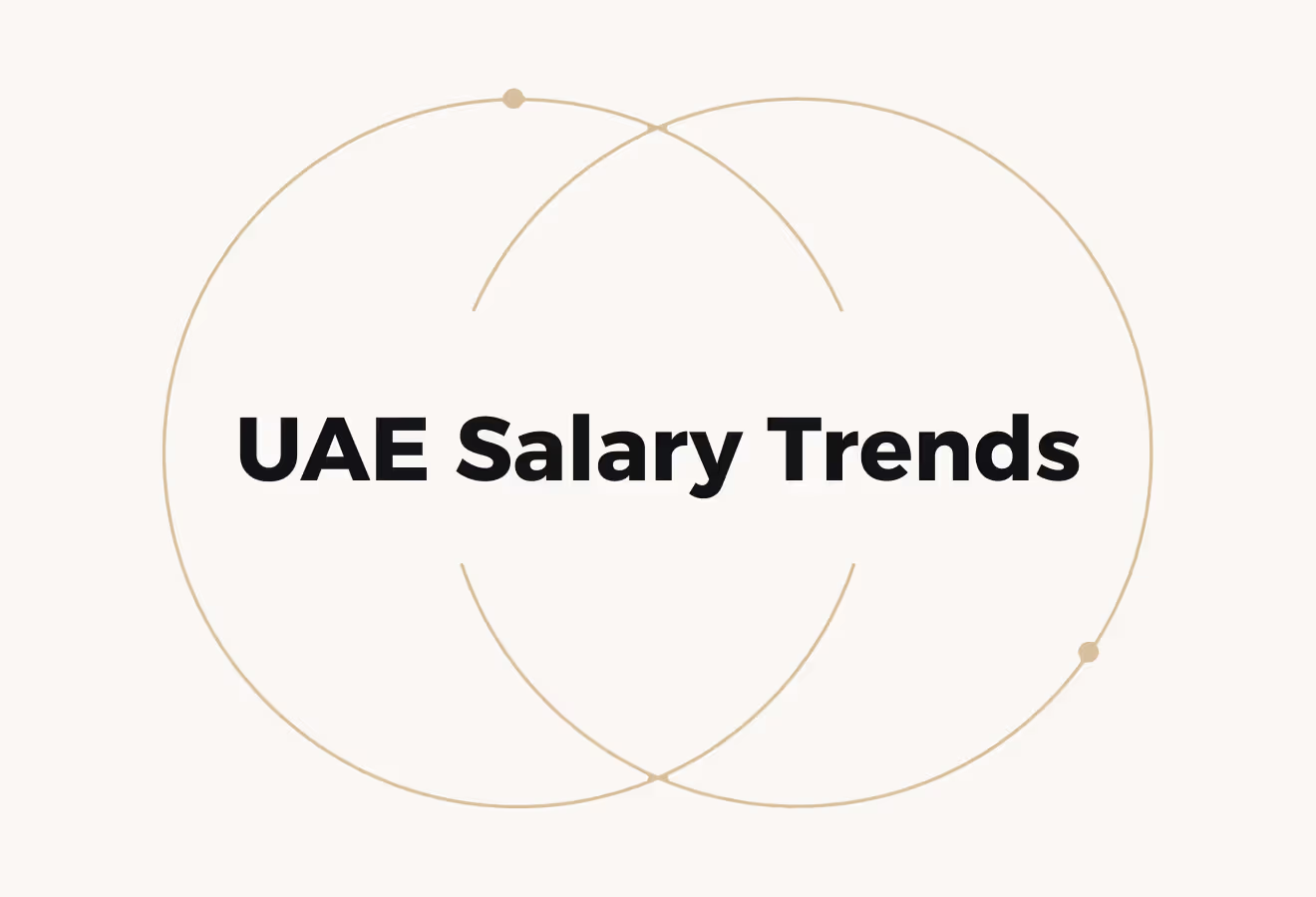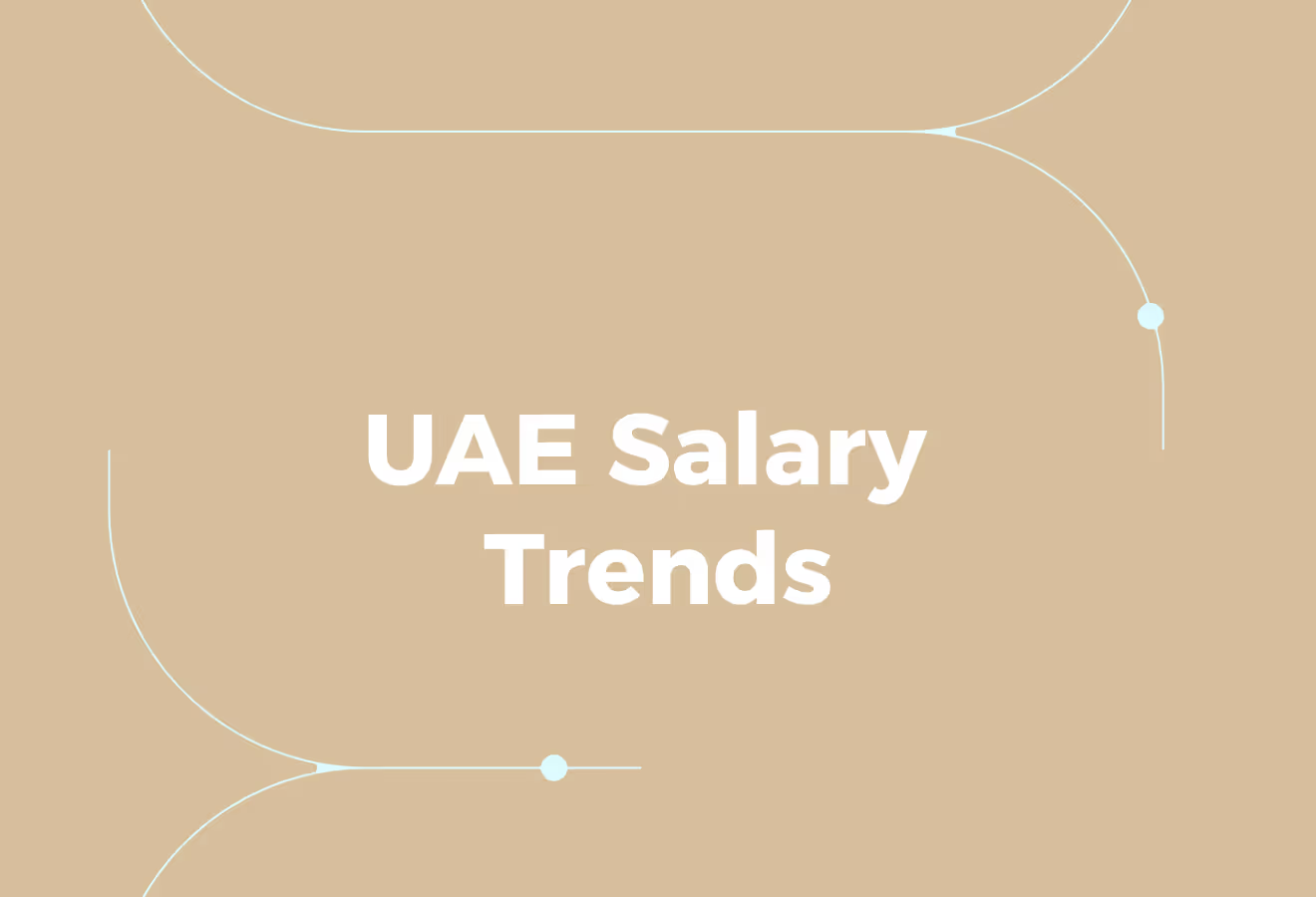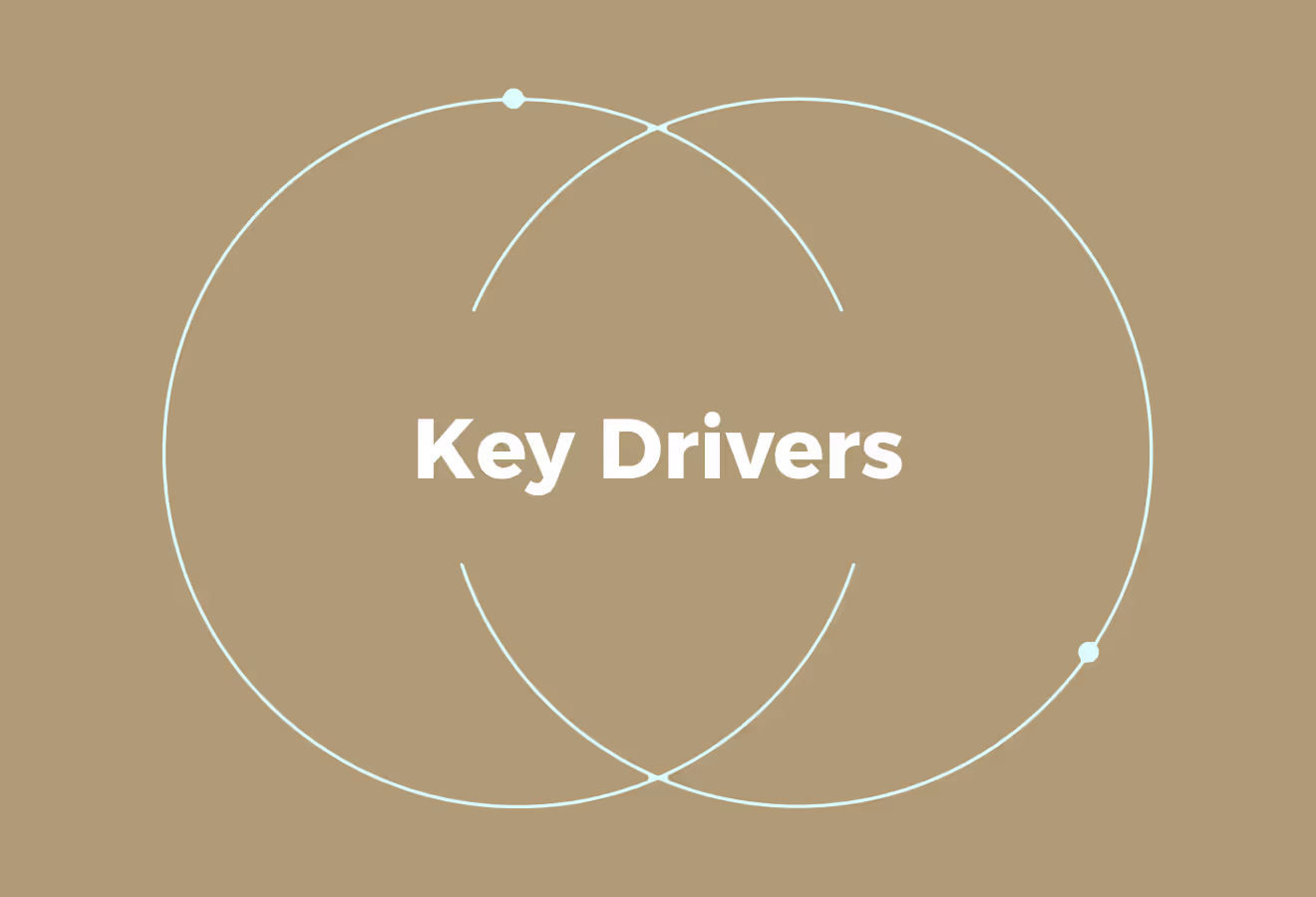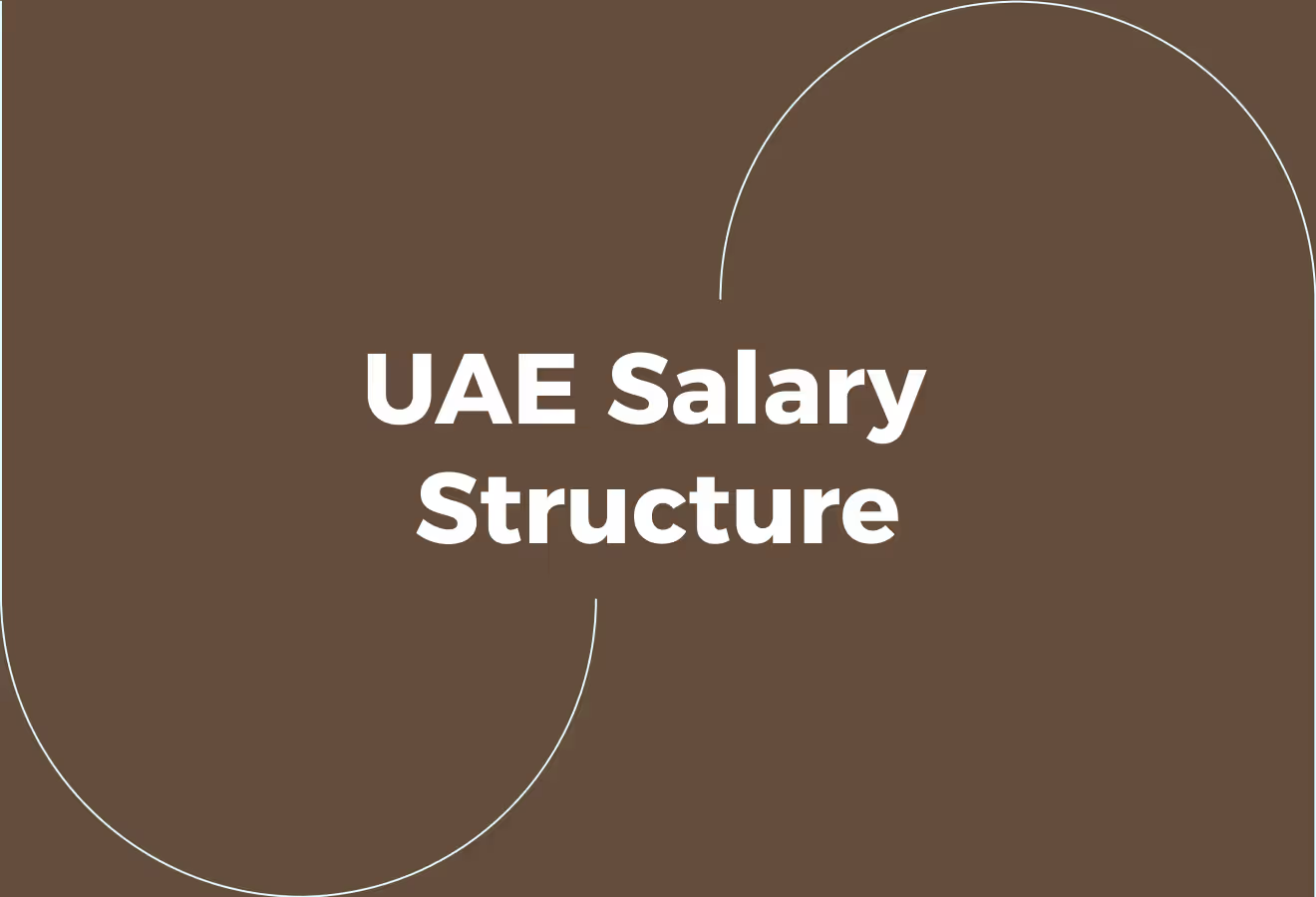UAE Salary Trends 2025: Trends & Strategies for Employers to Attract Talent

Finding and keeping top talent has become more challenging than ever for UAE businesses. With remote working options and outside competition, employers must adjust to new expectations and offer attractive compensation packages in the UAE tailored to individual employee needs. The UAE Salary Guide provides the data and insights to help organisations create these packages. This article explains the latest trends affecting salaries in the UAE, enabling you to attract the talent your business needs to succeed.
Cercli's global HR system can help you smoothly implement the strategies you find in this UAE Salary Guide. Our customisable software makes onboarding, payroll, and compliance easy, so you can focus on building your team.
UAE Salary Trends for 2025

Salaries in the UAE are projected to grow by 4 per cent across all industries in 2025, according to Mercer’s latest Total Remuneration Survey. The findings also reveal that more than a quarter of organisations (28.2 per cent) are planning to increase headcount in the coming year, an encouraging sign for:
- Employers managing growth
- Retention
- Recruitment strategies
Mercer’s report is based on insights from over 700 companies operating in key UAE sectors, including:
- Energy
- Financial services
- Engineering
- Construction
- Real estate
- Manufacturing
- Retail and wholesale
- Services
- Life sciences
- Technology
These industries continue to play a significant role in the country’s economic diversification efforts and talent development initiatives.
Projected Salary Increases by Sector
While the average projected increase is 4 per cent, some industries are anticipating higher growth:
- Consumer goods: 4.5 per cent
- Life sciences: 4.2 per cent
- Technology: 4.1 per cent
- Energy and financial services: 4 per cent, aligned with the market average
Companies across sectors plan to apply salary adjustments evenly across all job levels, signalling a broader approach to pay equity and retention.
What’s Driving the Rise in Salaries?
Several structural and economic factors are influencing salary trends.
- Cost of living: Employers are factoring in rising living expenses in cities like Dubai and Abu Dhabi when reviewing compensation packages in UAE.
- Hybrid working: As flexible work models become standard, pay expectations are evolving, especially for roles that demand digital and cross-functional skills.
- Economic growth: Continued investment in infrastructure, tourism, logistics, and technology is creating strong demand for skilled professionals.
- Emiratisation: The drive to attract and retain UAE Nationals is reshaping salary strategies, particularly in regulated sectors and large corporates.
These trends underscore the importance of regularly reviewing compensation structures to remain competitive in a maturing and increasingly globalised market. As companies plan for the year ahead, aligning reward strategies with market data and workforce expectations will be key to building sustainable teams and retaining critical talent.
Related Reading
Key Drivers Influencing UAE Salaries

Experience and Seniority: The Correlation Between Pay and Skill Level
Salaries in the UAE vary significantly depending on experience level. Entry-level professionals can expect to earn considerably lower wages than mid-career and senior-level executives.
This difference reflects the variations in:
- Job responsibilities
- Decision-making authority
- Market value
In many industries, experienced professionals are increasingly commanding higher pay due to their ability to lead teams and manage complex functions.
Industry-Specific Demand: Where Are the Talent Shortages?
Specific sectors in the UAE consistently offer above-average salaries due to strong demand for specialised talent. In particular, fields such as AI, cybersecurity, financial technology, and data analytics are seeing notable salary premiums. Employers in these areas often compete internationally for talent, which places upward pressure on compensation levels.
Professional Qualifications and Technical Skills: Getting Paid for What You Know
Formal qualifications and industry-recognised professional certifications also play a substantial role in determining salary levels. Professionals holding credentials such as the CFA (Chartered Financial Analyst) or AWS (Amazon Web Services) qualifications are often compensated at higher rates, particularly when their skills align with business-critical functions.
Location-Based Differences: Where You Work Matters
Geography remains a key consideration. Salaries in Dubai and Abu Dhabi are generally higher than those offered in other emirates. This reflects not only the cost of living in the larger cities based there but also the concentration of:
- Regional headquarters
- Financial institutions
- International firms
Company Size and Type: The Compensation Gap Between Start-ups and Multinationals
The scale and structure of an organisation can directly influence its compensation framework. Multinational corporations and large enterprises tend to offer higher salaries, broader benefits, and more structured career progression pathways compared to start-ups and SMEs, where budgets may be tighter and roles more fluid.
Related Reading
UAE Salary Structure: What Employers Need to Know

Understanding the structure of employee compensation in the UAE is essential for employers aiming to remain competitive and compliant. A well-structured salary package not only helps attract and retain talent but also ensures alignment with local regulations and market expectations.
Basic Components of UAE Salary Packages
When determining salaries in the UAE, it is essential to understand the various components that comprise an employee’s total remuneration.
Basic Salary
The basic salary is the foundation of any remuneration package. While the UAE labour law does not prescribe a universal minimum wage, companies typically set salary levels based on role, qualifications, and internal pay structures. The basic salary also serves as the basis for calculating statutory end-of-service benefits.
Allowances
Allowances often make up a significant portion of an employee’s total compensation.
Common allowances include:
- Housing: Either in the form of an allowance or company-provided accommodation.
- Transport: Reimbursement or a fixed amount to cover daily commuting.
- Utilities: Less common, but sometimes offered as part of senior roles or relocation packages.
- Cost of living: In some sectors, particularly when relocating staff, employers include an additional buffer to account for local living costs.
Bonuses
Performance-based bonuses, annual bonuses, and incentives tied to sales or retention are widely used across sectors. In some companies, festival bonuses or project completion incentives are also offered to encourage loyalty and recognise contribution.
Benefits Package
A well-structured salary package in the UAE includes both cash compensation and benefits. While some benefits are mandatory under UAE labour law, many employers offer additional perks to attract and retain talent.
Mandatory Benefits
Employers are required to provide certain benefits under UAE labour law:
- Health Insurance: Compulsory for all employees, with minimum coverage levels set by each emirate.
- End-of-Service Gratuity: Calculated based on the basic salary and length of service, this is paid out upon termination or resignation, rather than as a pension, for expatriates.
- Pensions for UAE Nationals: Enrolment in the General Pension and Social Security Authority (GPSSA) is required for eligible Emirati employees.
Optional Benefits
Many employers offer additional benefits to remain competitive, such as:
- Education Allowances: Particularly for expatriate staff with school-aged children.
- Flexible and Remote Working Options: Increasingly popular, especially in knowledge-based sectors.
- Wellbeing Programmes: Including mental health support, gym memberships, and wellbeing days.
- Enhanced Parental Leave: Beyond the legal minimum, particularly for senior roles or as part of retention strategies.
Regulatory & Compliance Considerations
Employers in the UAE must remain up to date with labour laws and payroll regulations. For some companies, this may also include compliance with the Wages Protection System (WPS), which is mandatory for entities falling under its scope to ensure salaries are paid accurately and on time.
Compliance considerations include:
- Wages Protection System (if applicable): Submitting payroll data digitally through WPS in line with Ministry of Human Resources and Emiratisation (MOHRE) requirements.
- Proper documentation: Maintaining accurate employment contracts, payroll records, and supporting documentation.
- End-of-service gratuity: Calculating gratuity entitlements correctly in line with contract terms and years of service.
- Social security contributions: Ensuring mandatory pension and social security obligations are met for UAE nationals.
- Policy updates: Staying informed about evolving labour law provisions, including flexible and remote work policies that may impact how salaries, allowances, and benefits are structured.
A well-designed salary structure in the UAE is more than a legal obligation; it demonstrates an employer’s awareness of the local employment landscape and their commitment to long-term talent strategies. By aligning compensation with both regulatory requirements and employee expectations, businesses can build sustainable employment relationships and strengthen their market reputation.
Beyond Salary: What Top Talent Expects

Flexible Work Arrangements: The New Standard
Hybrid working has become a standard expectation in many sectors. Professionals value the ability to manage their time between home and the office, especially in roles where performance is not tied to physical presence. Flexibility supports work-life balance and contributes to employee satisfaction and retention.
Comprehensive Benefits Packages: More Than Just a Salary
Benefits beyond basic pay are essential.
These typically include:
- Housing allowances
- Private health insurance
- Annual air travel allowance
- Education support for dependents
For international talent relocating to the UAE, such benefits are often crucial in the decision-making process.
Bonuses and Long-Term Incentives: Rewarding Contribution to Business Goals
Performance-based bonuses, profit-sharing schemes, and long-term incentive plans, such as equity or deferred compensation, are increasingly used to reward contributions and encourage longer tenures. These mechanisms help align employee goals with business outcomes.
Career Development and Upskilling: Attracting Top Talent
Top performers actively seek out employers that invest in their development. Providing access to professional qualifications, workshops, and structured training programmes signals a commitment to employee growth. This not only improves retention but also ensures the organisation remains competitive in terms of internal capabilities.
Clear Career Progression: Cultivating a Culture of Growth
Professionals are more likely to remain with employers who offer:
- Transparent promotion pathway
- Regular performance reviews
- Mentorship programmes
These elements provide clarity on prospects, helping address one of the most common reasons professionals leave: a lack of growth opportunities.
Related Reading
Book a Demo to Speak with Our Team about Our Global HR System
Cercli is designed for companies in the Middle East that need a flexible, compliant, and reliable way to manage their workforce, whether teams are local, remote, or across multiple countries. Built for the realities of doing business in the region, Cercli helps companies in the UAE, Saudi Arabia, and across MENA simplify HR operations, stay compliant with local regulations, and run payroll with confidence.
From managing WPS (Wage Protection System) registrations in the UAE, processing GOSI in Saudi Arabia, handling DEWS contributions, and ensuring contracts and benefits are compliant, Cercli simplifies regional payroll and HR. As companies hire remote employees, contractors, and global teams, Cercli provides comprehensive support for global workforce management.
Global Payroll and HR Administration Made Simple
Companies can pay contractors or full-time employees in over 150 countries through multicurrency payroll, Employer of Record (EOR) services, and compliant international contracts, all through a single platform.
Cercli gives HR teams a centralised system to manage every part of the employee lifecycle:
- Onboarding, asset management
- Leave tracking
- Time off calendars
- Payroll processing
- Offboarding
With one source of truth for all employee data, companies can eliminate manual processes, reduce payroll errors, and ensure complete visibility across the entire organisation.










